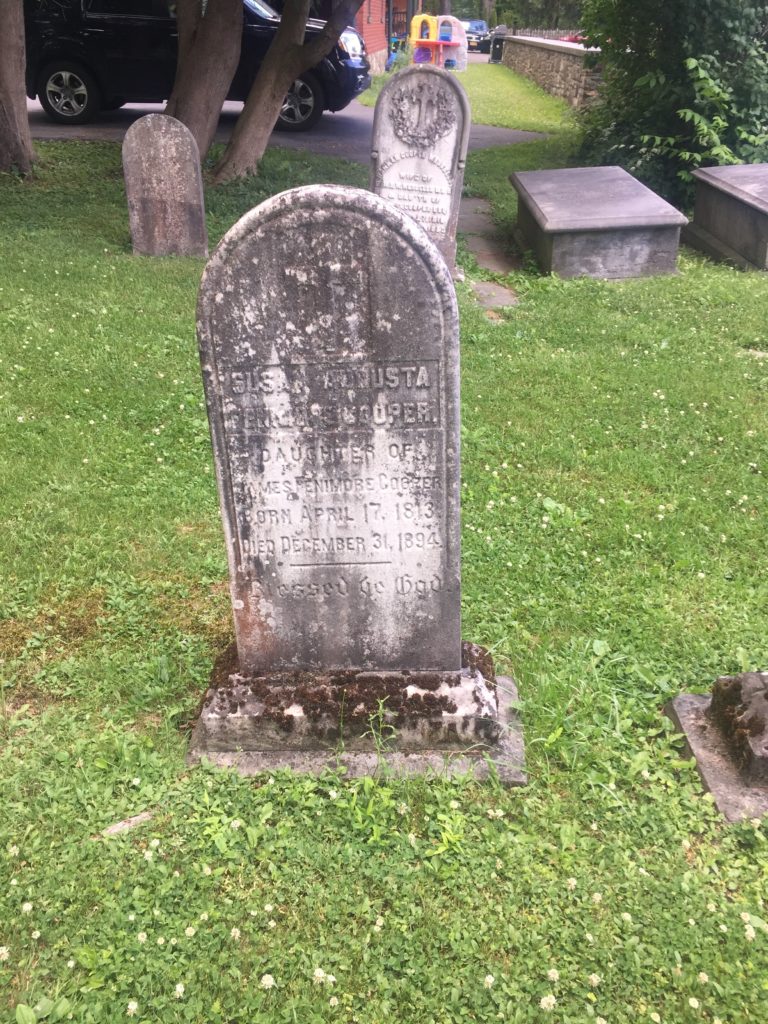Erik Visits an American Grave, Part 661
This is the grave of Susan Fenimore Cooper.

Born in 1813 in Scarsdale, New York, the daughter of the famous writer James Fenimore Cooper, Susan Fenimore Cooper lived her life in the shadow of her father. She was his favorite child and dedicated most of her long career to the service of his writings and memory. She followed him to Lyons, France in 1826, when he was named U.S. Consul for the city. They lived there and in Paris and Italy until 1833. He trained her in much of her education and she traveled around on his many journeys, serving as basically his secretary. She never married and essentially her spouse was her father’s career.
All of this said, Susan Fenimore Cooper was a lot more than just her father’s assistant. She was an important writer in her own right, especially on the nature of New York. She published her book anonymously. That was Rural Hours, from 1850. This was a pioneering natural history and set of observations on life in rural New York. In it, she showed her amazing skill at portraying the region’s birds and plants in what still hold up as beautiful drawings. This book, while not getting nearly the attention of Henry David Thoreau’s Walden, is one of the most important mid-nineteenth century books about American nature. Her work on these issues has received more attention from scholars in recent years and Rural Hours was excerpted in the Library of America’s American Earth: Environmental Writing since Thoreau anthology, published in 2008. Rural Hours was a big success on the market too. It went through six editions by the late 1880s. Its explicit call to preserve the last of the region’s forests was unusual for its time as well. This was a time when the trees were simply disappearing from the northeast, which is far more forested today than it was in 1850. Among other things, the book attracted attention from Charles Darwin, who wrote how much he enjoyed it and wondered who this Susan Cooper was, as by this time, she had placed her name on the book.
Cooper published some follow-up books about nature, though they did not sell as well. She also published a famous 1870 letter on women’s suffrage over several issues of Harper’s. She opposed it and any form of women’s equality. This should not surprise us: the Coopers were political reactionaries. Here’s an excerpt:
The really critical point with regard to the present position of women in America is the question of work and wages. Here the pocket of man is touched. And the pocket is the most sensitive point with many men, not only in America, but all the world over. There can be no doubt whatever that women are now driven away from certain occupations, to which they are well adapted, by the selfishness of some men.
And in many departments where they are day-laborers for commercial firms they are inadequately paid, and compelled to provide food, lodging, fuel and light out of scanty wages. Yes, we have here one of the few real grievances of which American women have a just right to complain. But even here – even where the pocket is directly touched, we still believe that women may obtain full justice in the end, by pursuing the right course.
Only let the reality of the grievance be clearly proved, and redress will follow, ere long. Providence has the power of bringing good out of evil; and therefore we believe that the movement now going on will here, at least, show some lasting results for good… Our women, twenty years hence, shall be better paid in some of their old fields of labor; and new openings, appropriate to their abilities, mental and physical, shall also be made for them.
And here they are much more likely to succeed without the suffrage than with it. It is not by general law-making that they can better themselves in these particulars. Individual fitness for this or that branch of work is what is required for success. And if, by thorough preparation, women can discharge this or that task, not essentially masculine in its requirements, as well as men, they may rest assured that in the end their wages will be the same as those of their fathers and brothers in the same field of work.
She had an early novel that was never well-received. She also played her expected role in Cooperstown, the town founded by her famous grandfather, as the matron involved in charitable projects. She had grown up there, with her father moving back to his home town the year she was born. She was involved in opening hospitals, as well as a large orphanage in the town.
Cooper would have written a biography of her father, but he explicitly forbade her from doing so before he died and she didn’t disobey him. She was his literary executor after his 1851 death. In fact, James Fenimore Cooper was a tyrant toward his daughter. He rejected anyone who sought to marry her, including Samuel Morse. When a Frenchman sought her hand, he said that he was an American and the family intended to stay American. She evidently had no say in the matter.
Cooper died in 1894, at the age of 81.
Susan Fenimore Cooper is buried in Christ Churchyard, Cooperstown, New York.
This grave post was funded by LGM reader contributions. In fact, it’s the first post based out of a recent trip that was the first since the COVID nightmare started and travel basically ended. My tentative attempt to get back to normalcy did result in a good drive and some quality graves. If you would like this series to visit other women who were environmental writers, you can donate to cover the required expenses here. Lydia Huntley Sigourney is in Hartford and Jane Jacobs is in Almedia, Pennsylvania. Previous posts in this series are archived here.


